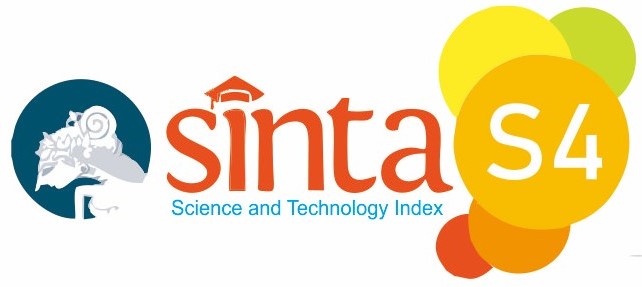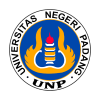ANALISIS FAKTOR PENGHAMBAT MINAT MAHASISWA DALAM MENGIKUTI PROGRAM KAMPUS MENGAJAR
Abstract
Minimnya pemahaman mahasiswa tentang manfaat Program Kampus Mengajar menjadi kendala utama, karena jika mahasiswa tidak melihat hubungan antara program tersebut dan pengembangan karir mereka, minat mereka dapat berkurang. Untuk mengatasi masalah ini, perlu dilakukan upaya meningkatkan pemahaman, komunikasi efektif, dan dukungan menyeluruh dari perguruan tinggi dan pihak terkait lainnya. Penelitian ini bertujuan untuk mengeksplorasi faktor-faktor yang menghambat minat mahasiswa dalam mengikuti Program Kampus Mengajar di Departemen Teknik Mesin Universitas Negeri Padang. Dengan menggunakan pendekatan kuantitatif, studi melibatkan mahasiswa Teknik Mesin sebagai subjek penelitian, dengan proses penelitian mencakup validasi instrumen dan pengumpulan data. Instrumen penelitian dianggap sangat valid dan reliabel oleh dua validator. Analisis data menggunakan Structural Equation Modeling (SEM) dengan perangkat lunak Smart PLS. Hasil penelitian menunjukkan bahwa faktor-faktor intrinsik dan ekstrinsik mempengaruhi minat mahasiswa dalam mengikuti Program Kampus Mengajar, dengan kontribusi sebesar 75%. Motivasi memiliki dampak positif signifikan pada program ini, dengan Path Coefficient sebesar 0,458, t-statistik (3,039), dan p-values sebesar 0,002. Sementara faktor-faktor lain seperti ketertarikan, aktivitas, lingkungan, dan dosen memberikan dampak positif namun tidak signifikan, sementara indikator perhatian dan dukungan orang tua memberikan dampak negatif pada minat mahasiswa. Hubungan positif dengan anggota fakultas, meskipun ada, tidak signifikan. Kesimpulan analisis menegaskan peran kunci dan signifikan motivasi dalam mendorong partisipasi mahasiswa. Perlu dicatat bahwa penelitian ini terbatas pada satu departemen, dan generalisasi temuan perlu dilakukan dengan hati-hati.
References
Abdelrahman, R. M. (2020). Metacognitive awareness and academic motivation and their impact on academic achievement of Ajman University students. Heliyon, 6(9), e04192. https://doi.org/10.1016/j.heliyon.2020.e04192
Amirudin, A., Tjalla, A., & Indrajit, R. E. (2022). An Analysis of Critical Education Study on Independent Learning Campus Policy. Jurnal Basicedu, 6(2), 2777–2782. https://doi.org/10.31004/basicedu.v6i2.2482
Ammad, S., Alaloul, W. S., Saad, S., & Qureshi, A. H. (2021). Personal Protective Equipment (PPE) usage in Construction Projects: A Systematic Review and Smart PLS Approach. Ain Shams Engineering Journal, 12(4), 3495–3507. https://doi.org/10.1016/j.asej.2021.04.001
Anwar, R. N. (2021). Pelaksanaan Kampus Mengajar Angkatan 1 Program Merdeka Belajar Kampus Merdeka di Sekolah Dasar. Jurnal Pendidikan Dan Kewirausahaan, 9(1), 210–219. https://doi.org/10.47668/pkwu.v9i1.221
Camacho, A., Correia, N., Zaccoletti, S., & Daniel, J. R. (2021). Anxiety and Social Support as Predictors of Student Academic Motivation During the COVID-19. Frontiers in Psychology, 12(May), 1–11. https://doi.org/10.3389/fpsyg.2021.644338
Castro, M. D. B., & Tumibay, G. M. (2021). A literature review: efficacy of online learning courses for higher education institution using meta-analysis. Education and Information Technologies, 26(2), 1367–1385. https://doi.org/10.1007/s10639-019-10027-z
Chin W, M. G. (1998). The Partial Least Squares Approach to Structural Formula Modeling. Advances in Hospitality and Leisure, 8(2), 5.
Dai, S., Vo, T. T., Kehinde, O. J., He, H., Xue, Y., Demir, C., & Wang, X. (2021). Performance of Polytomous IRT Models With Rating Scale Data: An Investigation Over Sample Size, Instrument Length, and Missing Data. Frontiers in Education, 6, 1–18. https://doi.org/10.3389/feduc.2021.721963
Deria, A., Fadilah, M., Nisa, I. K., Fortuna, A., Fajriansyah, B., Salsabila, P., Mardiansyah, R., Alika, F. A., Lismita, L., & Junita, U. (2023). Effect of Project Based Learning (PJBL) Learning Model on Creative Thinking Ability of High School Biology Students: A Literature Review. PAKAR Pendidikan, 21(1), 58–64. https://doi.org/10.24036/pakar.v21i1.288
Etika, E. D., Pratiwi, S. C., Lenti, D. M. P. L., & Al Maida, D. R. (2021). Peran Mahasiswa Kampus Mengajar Angkatan 2 dalam Adaptasi Teknologi di SDN Dawuhan Sengon 2. Journal of Educational Integration and Development, 1(4), 281–290. https://doi.org/10.55868/jeid.v1i4.111
Febrianto, P. T., Maureen, I. Y., & Bachri, B. S. (2023). Evaluation of MBKM Program Implementation in Elementary Schools. Jurnal Pamator : Jurnal Ilmiah Universitas Trunojoyo, 16(3), 509–526. https://doi.org/10.21107/pamator.v16i3.20278
Fernández-Batanero, J. M., Montenegro-Rueda, M., Fernández-Cerero, J., & García-Martínez, I. (2022). Digital competences for teacher professional development. Systematic review. European Journal of Teacher Education, 45(4), 513–531. https://doi.org/10.1080/02619768.2020.1827389
Findler, F., Schönherr, N., Lozano, R., Reider, D., & Martinuzzi, A. (2019). The impacts of higher education institutions on sustainable development: A review and conceptualization. International Journal of Sustainability in Higher Education, 20(1), 23–38. https://doi.org/10.1108/IJSHE-07-2017-0114
Fortuna, A., Rahmansyaf, I., Prasetya, F., Syaputra, W. Z., Rahmadhani, D., Saklaili, S., Bagus, M. I., Linda, E. S., Andriani, W., Muhammad, T., & Deria, A. (2023). Design of Prototype Model Augmented Reality-Based Disaster Mitigation Learning Media as a Disaster Education Facility. PAKAR Pendidikan, 21(1), 44–57. https://doi.org/10.24036/pakar.v21i1.287
Fuadi, T. M., & Irdalisa, I. (2022). Merdeka Belajar Kampus Merdeka: Application in Education Faculty. AL-ISHLAH: Jurnal Pendidikan, 13(3), 2747–2756. https://doi.org/10.35445/alishlah.v13i3.1125
Gan, Y., Zhang, T., Gao, J., Li, Y., Zhang, J., & Wang, W. (2023). The classroom environment and college students’ being silent/hidden dropouts: The chain of mediating effects of college identification and academic achievement. Journal of Psychology in Africa, 33(1), 75–85. https://doi.org/10.1080/14330237.2023.2175965
Giesenbauer, B., & Müller-Christ, G. (2020). University 4.0: Promoting the transformation of higher education institutions toward sustainable development. Sustainability (Switzerland), 12(8), 1–27. https://doi.org/10.3390/SU12083371
Ifenthaler, D., & Yau, J. Y. K. (2020). Utilising learning analytics to support study success in higher education: a systematic review. Educational Technology Research and Development, 68(4), 1961–1990. https://doi.org/10.1007/s11423-020-09788-z
Khuzainey, I., Zulkifli, M. N., Sattar Rasul, M., & Pang, C. L. (2020). Technical competency among vocational teachers in malaysian public skills training institutions: Measurement model validation using PLS-SEM. Journal of Technical Education and Training, 12(Special Issue), 163–175. https://doi.org/10.30880/jtet.2020.12.01.017
Kumari, R., Kwon, K. S., Lee, B. H., & Choi, K. (2020). Co-creation for social innovation in the ecosystem context: The role of higher educational institutions. Sustainability (Switzerland), 12(1), 1–21. https://doi.org/10.3390/su12010307
Memon, M. A., Ramayah, T., Cheah, J. H., Ting, H., Chuah, F., & Cham, T. H. (2021). PLS-SEM Statistical Programs: a Review. Journal of Applied Structural Equation Modeling, 5(1), 1–14. https://doi.org/10.47263/JASEM.5(1)06
Muskhir, M., Luthfi, A., Julian, R., & Fortuna, A. (2023). Exploring iSpring Suite for Android-Based Interactive Instructional Media in Electrical Lighting Installation Subject. International Journal of Interactive Mobile Technologies (IJIM), 17(22), 67–84. https://doi.org/10.3991/ijim.v17i22.42625
Patricia Aguilera-Hermida, A. (2020). College students’ use and acceptance of emergency online learning due to COVID-19. International Journal of Educational Research Open, 1, 100011. https://doi.org/10.1016/j.ijedro.2020.100011
Pichardo, J. I., López-Medina, E. F., Mancha-Cáceres, O., González-Enríquez, I., Hernández-Melián, A., Blázquez-Rodríguez, M., Jiménez, V., Logares, M., Carabantes-Alarcon, D., Ramos-Toro, M., Isorna, E., Cornejo-Valle, M., & Borrás-Gené, O. (2021). Students and teachers using mentimeter: Technological innovation to face the challenges of the covid-19 pandemic and post-pandemic in higher education. Education Sciences, 11(11), 1–18. https://doi.org/10.3390/educsci11110667
Prasetya, F., Fortuna, A., Samala, A. D., Fajri, B. R., Efendi, F., & Nyamapfene, A. (2023). Effectiveness of Distance Learning Computer Numerical Control Based on Virtual Laboratory Using a Metaverse Platform to Improve Students’ Cognitive Ability and Practice Skills. International Journal of Interactive Mobile Technologies (IJIM), 17(24), 4–21. https://doi.org/10.3991/ijim.v17i24.45019
Purwanti, E. (2021). Preparing the Implementation of Merdeka Belajar – Kampus Merdeka Policy in Higher Education Institutions. Advances in Social Science, Education and Humanities Research, 518, 384–391. https://doi.org/10.2991/assehr.k.210120.149
Restu, R., Sriadhi, S., Gultom, S., & Ampera, D. (2022). Implementation Of The Merdeka Belajar-Kampus Merdeka Curriculum Based On The RI 4.0 Platform At Universitas Negeri Medan. Journal of Positive School Psychology, 6, 10161–10176. https://doi.org/10.26803/ijlter.22.3.28
Romano, L., Angelini, G., Consiglio, P., & Fiorilli, C. (2021). Academic resilience and engagement in high school students: The mediating role of perceived teacher emotional support. European Journal of Investigation in Health, Psychology and Education, 11(2), 334–344. https://doi.org/10.3390/ejihpe11020025
Salam, M., Awang Iskandar, D. N., Ibrahim, D. H. A., & Farooq, M. S. (2019). Service learning in higher education: a systematic literature review. Asia Pacific Education Review, 20(4), 573–593. https://doi.org/10.1007/s12564-019-09580-6
Shofia, S., Husnita, L., & Junaidi, J. K. (2023). Partisipasi Mahasiswa dalam Program Kampus Mengajar , Merdeka Belajar – Kampus Merdeka (MBKM). Jurnal Pendidikan Tambusai, 7, 20284–20291. https://doi.org/10.31004/jptam.v7i3.9473
Taylor, M. E., & Boyer, W. (2020). Play-Based Learning: Evidence-Based Research to Improve Children’s Learning Experiences in the Kindergarten Classroom. Early Childhood Education Journal, 48(2), 127–133. https://doi.org/10.1007/s10643-019-00989-7
Ünal, U. (2021). Structural Equation Modeling as a Marketing Research Tool: A Guideline for SEM Users About Critical Issues and Problematic Practices. İstatistik ve Uygulamalı Bilimler Dergisi, 2(2), 65–77. https://doi.org/10.52693/jsas.1015831
Warner, L. H. (2020). Developing Interpersonal Skills of Evaluators: A Service-Learning Approach. American Journal of Evaluation, 41(3), 432–451. https://doi.org/10.1177/1098214019886064
Yahya, A. H., Nur, D. M., Walian, A., Pohan, H. A., & Jawasi, J. (2022). Implementation of Merdeka Belajar-Kampus Merdeka in the Perspective of Communication Based Learning. Qalamuna - Jurnal Pendidikan, Sosial, Dan Agama, 14(2), 1073–1088. https://doi.org/10.37680/qalamuna.v14i2.3836
Yu, Z., Gao, M., & Wang, L. (2021). The Effect of Educational Games on Learning Outcomes, Student Motivation, Engagement and Satisfaction. Journal of Educational Computing Research, 59(3), 522–546. https://doi.org/10.1177/0735633120969214
Submitted
Copyright (c) 2024 Jurnal Vokasi Mekanika

This work is licensed under a Creative Commons Attribution 4.0 International License.








.svg_.png)


